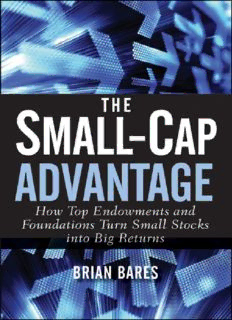Table Of ContentContents
Cover
Endorsement
Series
Title Page
Copyright
Dedication
Introduction
Acknowledgments
Chapter 1: The Small-Cap Advantage
TWO SOURCES OF OUTPERFORMANCE
SMALL-CAP DEFINITIONS
THE OUTPERFORMANCE OF SMALL-CAP STOCKS
OUTPERFORMANCE WITHIN THE SMALL-CAP
SPACE
Chapter 2: Small-Cap Disadvantages
RESEARCH
TRADING
THE SMALL-CAP GRAVEYARD AND REVERSE
SURVIVORSHIP BIAS
CAPPING ASSETS
Chapter 3: Small-Cap Investment Philosophy and
Process
INSTITUTIONAL APPROACH
PASSIVE AND ENHANCED INDEXING IN SMALL-CAP
STOCKS
ACTIVE MANAGEMENT IN SMALL-CAP STOCKS
Chapter 4: Small-Cap Manager Organization
CREATING VALUE FOR THE MANAGER
LAUNCHING A SMALL-CAP FIRM
INVESTMENT TEAM
Chapter 5: The Fund-Raising Process
GENERAL MARKETING STRATEGY
INSTITUTIONAL CLIENTS
FOUNDATIONS AND ENDOWMENTS
CONSULTING FIRMS
PENSION PLANS
HIGH-NET-WORTH INDIVIDUALS
WRAP FEE AND OTHER SUBADVISORY
RELATIONSHIPS
DATABASES
THIRD-PARTY MARKETERS
THE CHICKEN-AND-EGG PROBLEM
Chapter 6: Fees, Agency Issues, and Other
Performance Drags
COMMON PERFORMANCE DRAGS
FRICTIONAL COSTS IN SMALL CAPS
INSTITUTION-MANAGER AGENCY ISSUES
AGENCY ISSUES IN TRADING
BENCHMARK TYRANNY
COMMINGLED AND SEPARATE ACCOUNTS
Chapter 7: Small-Cap Managers and the Endowment
Model
THE ENDOWMENT-MODEL APPROACH TO SMALL
CAPS
FINDING AN EDGE
FUNDING SMALLER MANAGERS
FUNDING EMERGING MANAGERS
FINDING EMERGING MANAGERS
Chapter 8: Evaluating Small-Cap Managers
INSTITUTIONAL DUE DILIGENCE TEAMS
ASSESSING MANAGER RISK
ASSESSING INVESTMENT PHILOSOPHY
ANALYZING A MANAGER’S PROCESS
EVALUATING FIRM PRINCIPALS
ASSESSING MANAGER OPERATIONS
CONTRIBUTIONS AND WITHDRAWALS
Final Thoughts
Notes
About the Author
Index
Additional Praise for The Small-Cap
Advantage
“Small-cap investing presents unique opportunities as well as unique
challenges. Brian Bares masterfully details both in language that is
accessible and actionable for investment novices and pros alike.”
—John Heins, Co-Editor, Value Investor Insight
President, Value Investor Media, Inc.
“Brian Bares is a very talented small-cap stock investor, so it is no
surprise that The Small-Cap Advantage is a very worthwhile read. In the
ongoing search for investment added value, investment managers are
smart to heed the small-cap stock market and Brian’s thoughtful
perspectives on investing in these securities.”
—Bruce Zimmerman, CEO and CIO, University of Texas Investment
Management Company
“The Small-Cap Advantage is a must read for anyone intent on
generating superior investment returns in an area of the market that
frequently flies below the radar of large investment funds. Brian Bares
takes the reader through all the issues a professional investor focused on
small caps is likely to encounter, dispensing invaluable data and advice in
the process. I can’t imagine anyone better to write this much-needed
volume than Brian Bares, one of the most highly regarded small-cap
‘super-investors’ of his generation.”
—John Mihaljevic, CFA, Managing Editor, The Manual of Ideas
Founded in 1807, John Wiley & Sons is the oldest independent publishing
company in the United States. With offices in North America, Europe,
Australia and Asia, Wiley is globally committed to developing and marketing
print and electronic products and services for our customers’ professional and
personal knowledge and understanding.
The Wiley Finance series contains books written specifically for finance
and investment professionals as well as sophisticated individual investors and
their financial advisors. Book topics range from portfolio management to e-
commerce, risk management, financial engineering, valuation and financial
instrument analysis, as well as much more.
For a list of available titles, please visit our Web site at
www.WileyFinance.com.
Copyright © 2011 by Brian T. Bares. All rights reserved.
Published by John Wiley & Sons, Inc., Hoboken, New Jersey.
Published simultaneously in Canada.
No part of this publication may be reproduced, stored in a retrieval system, or
transmitted in any form or by any means, electronic, mechanical,
photocopying, recording, scanning, or otherwise, except as permitted under
Section 107 or 108 of the 1976 United States Copyright Act, without either
the prior written permission of the Publisher, or authorization through
payment of the appropriate per-copy fee to the Copyright Clearance Center,
Inc., 222 Rosewood Drive, Danvers, MA 01923, (978) 750-8400, fax (978)
646-8600, or on the Web at www.copyright.com. Requests to the Publisher
for permission should be addressed to the Permissions Department, John
Wiley & Sons, Inc., 111 River Street, Hoboken, NJ 07030, (201) 748-6011,
fax (201) 748-6008, or online at http://www.wiley.com/go/permissions.
Limit of Liability/Disclaimer of Warranty: While the publisher and author
have used their best efforts in preparing this book, they make no
representations or warranties with respect to the accuracy or completeness of
the contents of this book and specifically disclaim any implied warranties of
merchantability or fitness for a particular purpose. No warranty may be
created or extended by sales representatives or written sales materials. The
advice and strategies contained herein may not be suitable for your situation.
You should consult with a professional where appropriate. Neither the
publisher nor author shall be liable for any loss of profit or any other
commercial damages, including but not limited to special, incidental,
consequential, or other damages.
For general information on our other products and services or for technical
support, please contact our Customer Care Department within the United
States at (800) 762-2974, outside the United States at (317) 572-3993 or fax
(317) 572-4002.
Wiley also publishes its books in a variety of electronic formats. Some
content that appears in print may not be available in electronic books. For
more information about Wiley products, visit our web site at
www.wiley.com.
Library of Congress Cataloging-in-Publication Data:
Bares, Brian T., 1973–
Description:The historical returns of small-cap stocks have exceeded those of mid-cap and large-cap stocks over long time periods. The additional return experienced by small-cap investors has occurred despite inherent disadvantages in the asset class.The excess return available from small-cap stocks can help la

